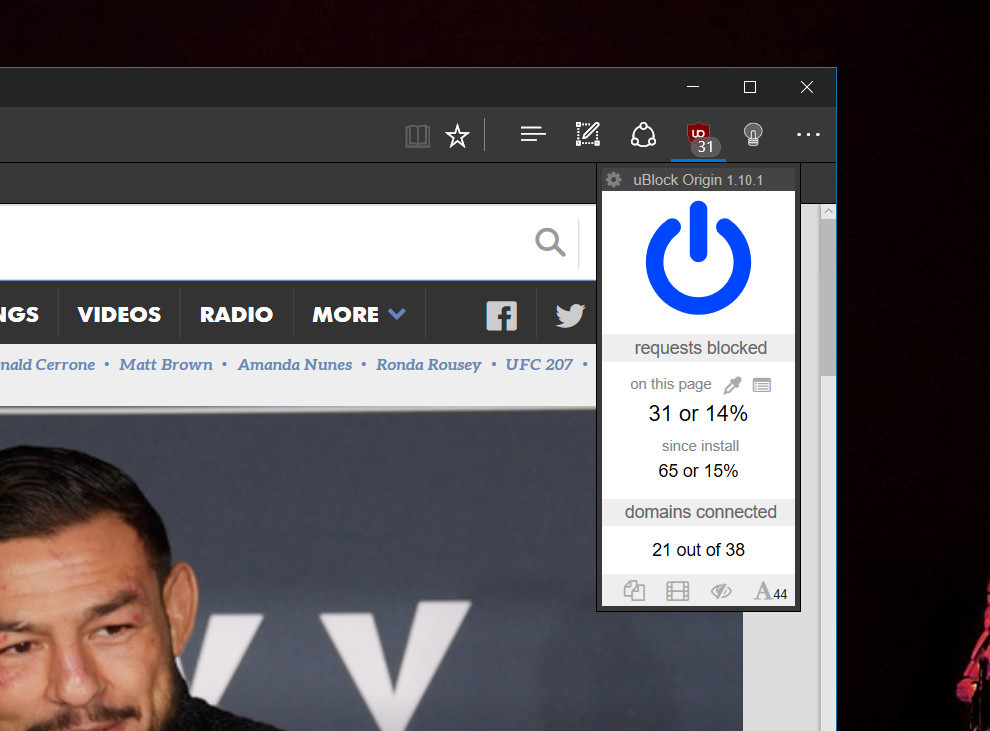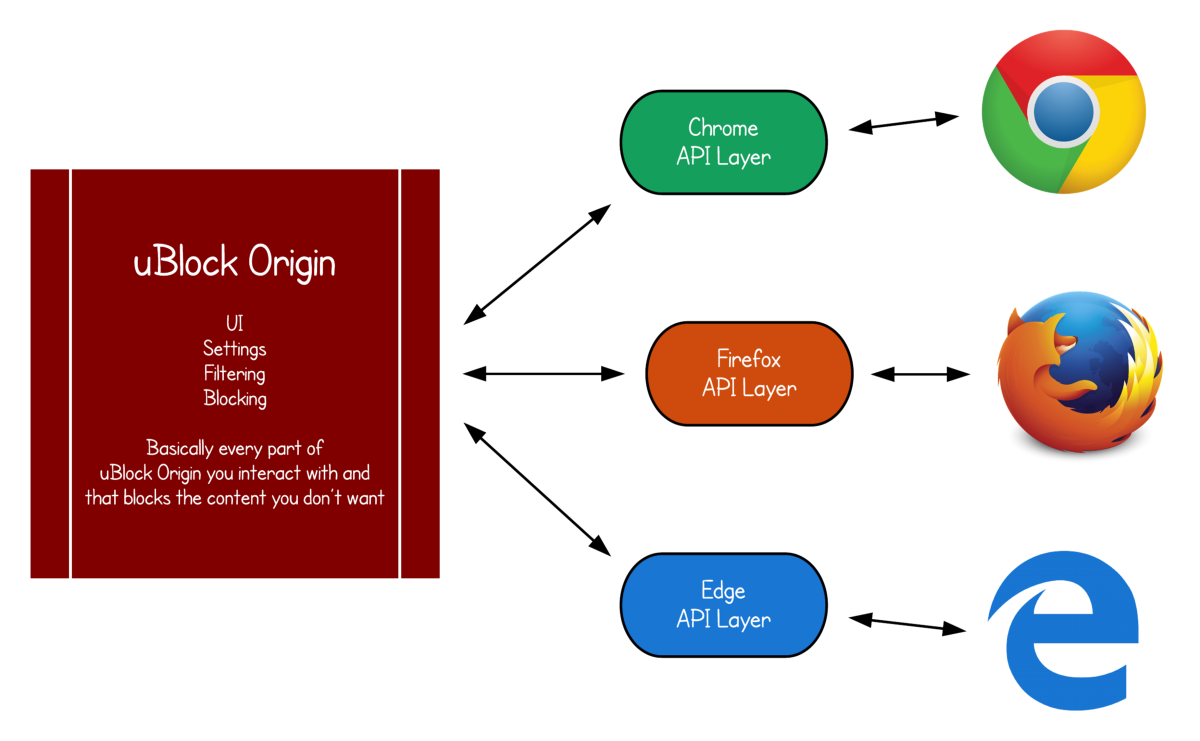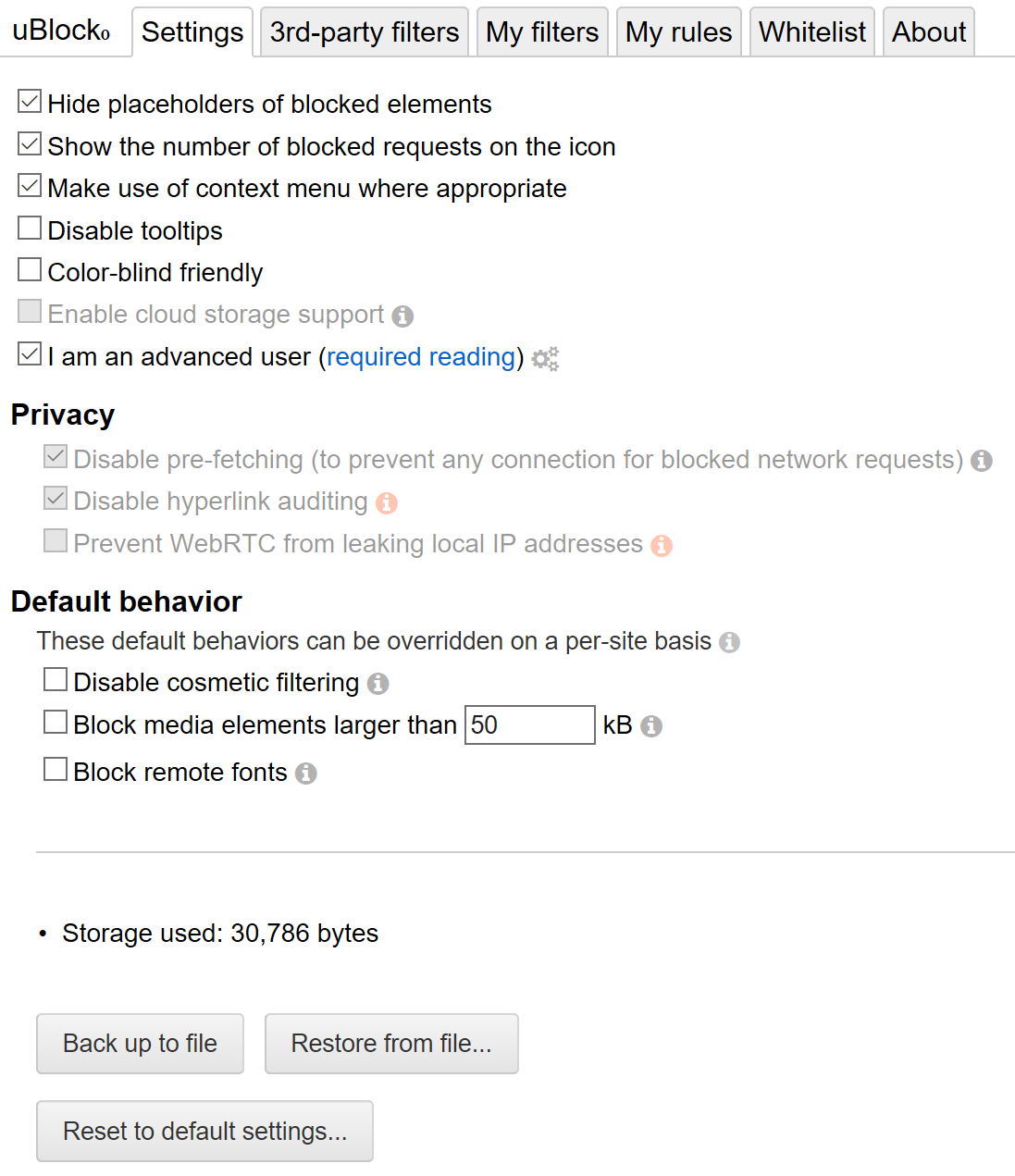Expansion uBlock Origin came to Microsoft Edge

Finally, the most effective ad blocker has come out to Microsoft Edge, which consumes minimal CPU and memory resources compared to other blockers, and is also open source. Of course, this is Raymond Hill's famous uBlock Origin.
Work on porting uBlock Origin for Microsoft Edge is in the uBlock-Edge repository on Github. On December 11, 2016, the project reached such a level that its author Nick Rolls (Nik Rolls) decided to upload uBlock-Edge to the Edge browser extensions in the official Windows Store catalog .
At this minute, the program earned 79 reviews, the average rating is 4.5 stars out of a possible 5: 72 out of 79 reviews are rated with the maximum rating, and the author of the only minimum rating gave 1 star by mistake, judging by his admiring review.
')
The extension is available for the Windows 10 operating system under x86 or x64 architecture. Publisher - Nick Rolls, he is the main developer of the ported version and the owner of the repository on Github. The size of the distribution for the installation of the extension - 6.62 MB.
Nick Rolls himself writes that the “crazy idea” of porting uBlock Origin for the Microsoft Edge browser came to him five months ago during a lunch break at work. As usual, developers use the rest time from programming in order to think over and discuss with their colleagues new software development ideas.
Then just recently released Windows 10 Anniversary Update, and with it appeared support extensions in Microsoft Edge. At that time, Adblock and Adblock Plus were already available for the Redmond browser, but for every advanced user who is sensitive to the protection of personal data, there was an obvious lack of the most effective uBlock Origin expansion in this list, which by all tests exceeds other extensions and It does not have a strange list of "allowed advertising" , on which Adblock Plus developers make money.
Nick Rolls immediately thought about how to port uBlock Origin to a new platform. And let not so many users use Windows 10 operating system and Edge browser, and the browser lacks technical oddities, for example, it does not know how to save open files (if there is no link). Individual geeks for Windows still choose this option, because Edge is superior in performance to Internet Explorer. At the same time, Edge is not available anywhere except Windows 10.
On the same day, the programmer came home, immediately made a copy of the uBlock Origin source code - and began programming. About an hour later, to his surprise, the guy achieved the functionality of the uBlock Origin core engine under Edge. Then he threw a cry on Windows Central that work was underway. The news did not go unnoticed: some boiling up began in the Windows programmer environment, so Nick had an excellent incentive to finish the job.
At that time, the extension catalog was not yet open to everyone, but after a few months, Microsoft representatives contacted the programmer about preparing the final release of uBlock Origin. In the future, he coordinated his work with them, receiving up-to-date information about changes in the Edge codebase and new browser features, as well as getting help on problems he couldn’t handle on his own.
Finally, on December 11, 2016, the day came when the uBlock Origin extension was officially accepted into the Windows Store catalog.
uBlock Origin (Preview) for Edge
Nick Rolls warns that the work is not finished. There are several problems that can be discussed in the comments to the repository and help in solving them. But in general, the extension works quite well, despite its declarative preview status.
Approximately 95% of the uBlock Origin code for Edge is the original code, the same one that works in the uBlock Origin extensions for Chrome and Firefox. The changes concern only the interface layer directly with the browser.

If you compare with the versions for Chrome and Firefox, then this extension is closest to the version for Chrome. They are very similar, because Edge programmers have done a lot of work to bring the Edge program interfaces closer to the Chrome “reference browser” program interfaces. So now it's relatively easy to port the Chrome extension to Edge .
Work on uBlock Origin continues, and Nick Rolls invites everyone to join it.
Given the small number of extensions under the Edge, the output of such a necessary and useful extension can only be welcomed. In terms of functionality, the Edge version is almost as good as the original, except for a few minor functions.

In principle, Microsoft is not so much dependent on advertising revenue as Google, so for the convenience of users it could easily integrate uBlock Origin directly into the Edge browser "out of the box." It would be the only mainstream browser with a built-in ad blocker, because Google is unlikely to decide on this. Mozilla, earning on affiliate programs with search engines that show ads in search results will not be solved either. This is practically the only source of income for Mozilla, just like Google.
Source: https://habr.com/ru/post/372967/
All Articles